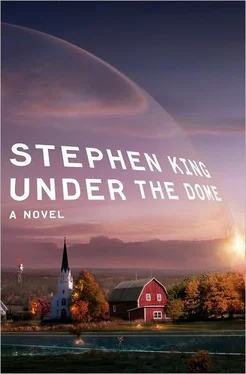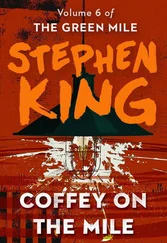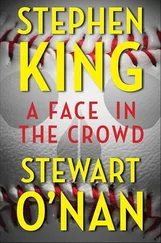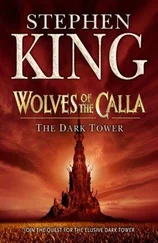“Goolfreds!” Junior cried. “Extendable! No gooby, French! All French, you fum-nuck!” He stuck out his tongue and flapped it rapidly against his lips. The noise was similar to the one Roadrunner makes before speeding away from Wile E. Coyote in a cloud of dust. Then he laughed and started back to the house.
“No, Junior,” Henry said, and grabbed him by the waistband of his pajama pants. “We have to—”
Junior wheeled around with surprising speed. No laughter now; his face was a twitching cat’s cradle of hate and rage. He rushed at Henry, flailing his fists. He stuck out his tongue and bit it with his champing teeth. He was gobbling in some strange language that seemed to have no vowels.
Henry did the only thing he could think of: stood aside. Junior plunged past him and began to hammer punches at the jackpot lights on top of the cruiser, smashing one of them and lacerating his knuckles. Now people were coming out of their houses to see what was happening.
“Gthn bnnt mnt!” Junior raved. “Mnt! Mnt! Gthn! Gthn!”
One foot slipped off the curb and into the gutter. He staggered but kept his feet. There was blood as well as spit hanging from his chin now; both hands were badly cut and dripping.
“She just made me so franning mad!” Junior screamed. “I kit her with my knee to shed her ump, and she frew a tit! Shit everywhere! I… I…” He quit. Appeared to consider. Said: “I need help.” Then popped his lips—the sound as loud as the report of a.22 pistol in the still air—and fell forward between the parked police car and the sidewalk.
Henry drove him to the hospital, using lights and siren. What he didn’t do was think about the last things Junior had said, things that almost made sense. He wouldn’t go there.
He had problems enough.
Rusty drove slowly up Black Ridge, looking frequently at the Geiger counter, which was now roaring like an AM radio set between stations. The needle rose from +400 to the +1K mark. Rusty was betting it would be swung all the way over to the +4K post by the time he topped the ridge. He knew this couldn’t be good news—his “radiation suit” was makeshift at best—but he kept going, reminding himself that rads were cumulative; if he moved fast, he wouldn’t pick up a lethal dose. I might temporarily lose some hair, but no way I’ll get a lethal dose. Think of it as a bombing run: get in, do your business, and get back out again.
He turned on the radio, got the Mighty Clouds of Joy on WCIK, and immediately turned it off again. Sweat rolled into his eyes and he blinked it away. Even with the air-conditioner blasting, it was devilishly hot in the van. He looked into the rearview mirror and saw his fellow explorers clustered together. They looked very small.
The roaring from the Geiger counter quit. He looked. The needle had dropped back to zero.
Rusty almost stopped, then realized if he did, Rommie and the kids would think he was in trouble. Besides, it was probably just the battery. But when he looked again, he saw that the power lamp was still glowing brightly.
At the top of the hill the road ended in a turnaround in front of a long red barn. An old truck and an even older tractor stood in front of it, the tractor leaning on a single wheel. The barn looked to be in pretty good condition, although some of the windows were broken. Behind it stood a deserted farmhouse with part of the roof crushed in, probably by the weight of winter snow.
The end of the barn was standing open, and even with the windows shut and the air-conditioning running full tilt, Rusty could smell the cidery aroma of old apples. He stopped next to the steps leading up to the house. There was a chain across these with a sign hanging from it: TRESPASSERS WILL BE PROSECUTED. The sign was old, rusty, and obviously ineffective. Beer cans were scattered the length of the porch where the McCoy family must once have sat on summer evenings, catching the breeze and looking over long vistas: the entire town of Chester’s Mill to the right, all the way into New Hampshire if you looked left. Someone had spray-painted WILDCATS RULE on a wall that had once been red and was now a faded pink. On the door, in spray paint of a different color, was ORGY DEPOT. Rusty guessed that was wishful thinking on the part of some sex-starved teenager. Or maybe it was the name of a heavy-metal band.
He picked up the Geiger counter and tapped it. The needle jumped and the instrument clucked a few times. It seemed to be working fine; it just wasn’t picking up any major radiation.
He got out of the van and—after a brief interior debate—stripped off most of his makeshift shielding, leaving only the apron, gloves, and goggles. Then he walked down the length of the barn, holding the sensor tube of the Geiger counter out in front of him and promising himself he’d go back for the rest of his “suit” the second the needle jumped.
But when he emerged from the side of the barn and the light flashed out no more than forty yards away, the needle didn’t stir. It seemed impossible—if, that was, the radiation was related to the light. Rusty could think of only one possible explanation: the generator had created a radiation belt to discourage explorers such as himself. To protect itself. The same could be true of the lightheadedness he’d felt, actual unconsciousness in the case of the kids. Protection, like a porcupine’s quills or a skunk’s perfume.
Isn’t it more likely that the counter’s malfunctioning? You could be giving yourself a lethal dose of gamma rays at this very second. The damn thing’s a cold war relic.
But as he approached the edge of the orchard, Rusty saw a squirrel dart through the grass and run up one of the trees. It paused on a branch weighted down with unpicked fruit and stared at the two-legs intruder below, its eyes bright, its tail bushed out. To Rusty it looked fine as fiddlesticks, and he saw no animal corpses in the grass,or on the overgrown lanes between the trees: no suicides, and no probable radiation victims, either.
Now he was very close to the light, its timed flashes so brilliant that he squeezed his eyes nearly shut each time it came. To his right, the whole world seemed to lie at his feet. He could see the town, toy-like and perfect, four miles away. The grid of the streets; the steeple of the Congo church; the twinkle of a few cars on the move. He could see the low brick structure of Catherine Russell Hospital, and, far to the west, the black smudge where the missiles had struck. It hung there, a beauty mark on the cheek of the day. The sky overhead was a faded blue, almost its normal color, but at the horizon the blue became a poison yellow. He felt quite sure some of that color had been caused by pollution—the same crap that had turned the stars pink—but he suspected most of it was nothing more sinister than autumn pollen sticking to the Dome’s unseen surface.
He got moving again. The longer he was up here—especially up here and out of view—the more nervous his friends would become. He wanted to go directly to the source of the light, but first he walked out of the orchard and to the edge of the slope. From here he could see the others, although they were little more than specks. He set the Geiger counter down, then waved both hands slowly back and forth over his head to show he was okay. They waved back.
“Okay,” he said. Inside the heavy gloves, his hands were slick with sweat. “Let’s see what we’ve got here.”
It was snack-time at East Street Grammar School. Judy and Janelle Everett sat at the far end of the play-yard with their friend Deanna Carver, who was six—thus fitting neatly between the Little Js, age-wise. Deanna was wearing a small blue armband around the left sleeve of her tee-shirt. She had insisted that Carrie tie it on her before she went to school, so she could be like her parents.
Читать дальше











